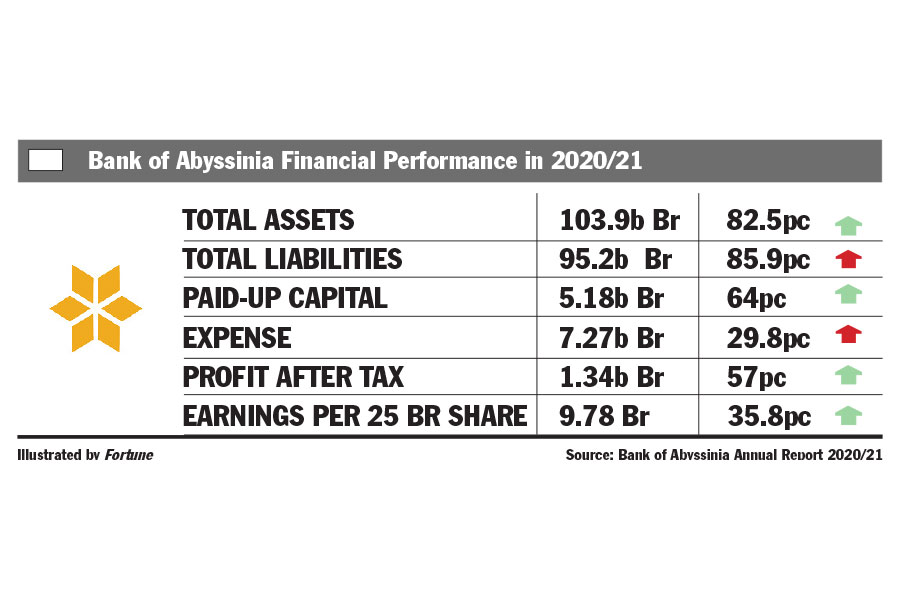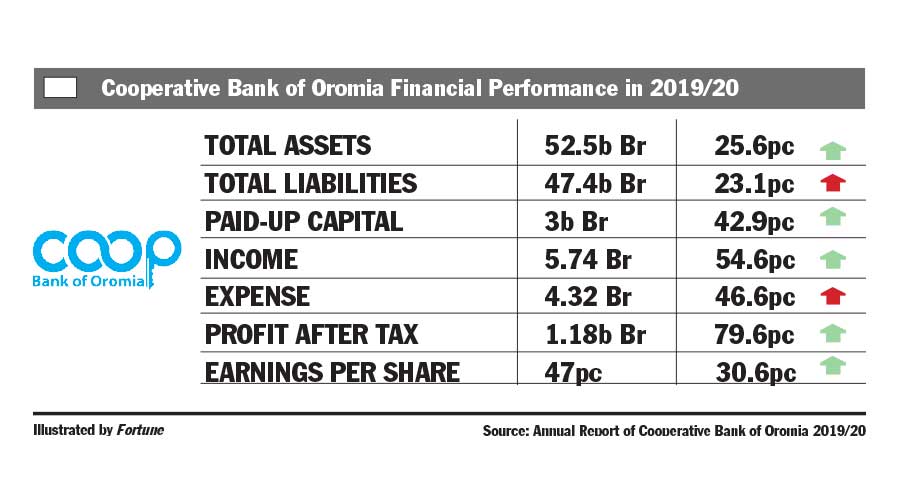
Radar | Mar 18,2023
Two senior executives of Dashen Bank have left to take the helms of newly-established financial institutions. Last week, Yared Mesfin, chief corporate banking officer, was approved by regulatory authorities to lead a recently incorporated private bank as president. Henok Kebede, former chief banking operation officer at Dashen, was appointed president of Amhara Bank a month ago.
Yared, 47, has been named president of Tsehay Bank, which has mobilised 734 million Br in paid-up capital from 373 shareholders, awaiting an operational permit from the central bank. The Bank's promoters plan to open for service this year.
Tsehay's promoters have appointed Yared after an intensive headhunt for the best suitable candidate, according to Tadesse Ayene, a promoter and board member at Tsehay.
"With his experience, we believe he would be a good fit for our Bank," Tadesse told Fortune.
Along with the President, the National Bank of Ethiopia (NBE) has approved 12 shareholders elected to serve Tsehay as directors.
Yared, a father of three, studied management at Addis Abeba University and later completed his post-graduate studies in business administration from Greenwich University of London. He began his banking career as a clerk with the Commercial Bank of Ethiopia (CBE), where he climbed to the position of district manager in Bahir Dar, with 50 branches, and North Addis Abeba with 80. Yared joined Dashen Bank in 2015 to serve as vice president of resource and facility management. He was appointed Chief Corporate Banking Officer four years later.
"I've gained sufficient administrative experience," said Yared.
His first tasks at Tsehay will be to procure a core banking system, set up branches, and prepare the Bank's long-term strategy. The President will also have to form his executive team.
Yared sees competition in the banking industry, coupled with the sizable capital and foreign currency requirements, as a challenge for new entrants into the industry such as Tsehay and Amhara banks.
As the arrival of the newly established financial institutions, dubbed by industry players as “fourth-generation banks," creates a ripple effect in the industry, banks that lose senior managers take rapid measures to fill the vacancies. Well-established banks such as Dashen and Awash are less likely to face challenges filling up executive spots, unlike newly formed banks, which have to pull human resources from the existing pool in the industry, observes Yared.
Immediately after the departure of its executives, Dashen promoted its senior directors as chiefs.
Ayele Teshome, former director of research and development, was appointed acting chief officer for the banking business, replacing Yared. Tibebu Solomon, previously a vice president of retail, filled Henok's as chief banking operation officer.
Henok will serve as the first president of Amhara Bank, a bank that has made a record 5.9 billion Br in paid-up capital. It is a capitalisation that puts Amhara Bank on par with Awash Bank, which reached 5.85 billion Br in paid-up capital since its establishment nearly three decades ago.
Henok began his career in banking with the CBE, starting as an operations officer in 2002. He climbed up the corporate ladder to the position of district manager, where he served for seven years until 2015. He joined Dashen Bank that same year as Chief Operating Officer, a responsibility he held until he was appointed a president for Amhara Bank. He studied management at Addis Abeba University before attending post-graduate studies in international business at the London-based Greenwich University.
A few months ago, interest-free banks ZamZam and Hijra appointed Melika Bedri and Dawit Keno as their founding presidents. Both were former executives of the state-owned CBE. Ahadu Bank, another bank that entered the industry recently, appointed Eshetu Fantaye, former head of Bunna Bank, as its founding president three months ago.
In July this year, the central bank introduced a directive allowing information technology (IT) professionals to serve in senior positions without having previous banking experience. However, the new rules did not repeal the terms outlined in a directive from 2019, which require candidates for presidential or vice-presidential positions to have at least 10 years of banking experience, of which a minimum of four years should be as department managers.
Dereje Zenebe, president of Zemen Bank, argues that a lack of entrants over the past decade means a large pool of qualified executives is up for the taking.
“The formation of new banks is an opportunity for them to take on bigger roles,” said Dereje.
PUBLISHED ON
Nov 13,2021 [ VOL
22 , NO
1124]

Radar | Mar 18,2023

Fortune News | May 23,2020

Commentaries | Nov 05,2022

Radar | Oct 30,2021

Commentaries | Jul 27,2024

Fortune News | Jan 01,2022

Fortune News | Feb 27,2021

Viewpoints | Oct 26,2024

Covid-19 | Mar 31,2020

Radar | Aug 21,2021

Dec 22 , 2024 . By TIZITA SHEWAFERAW
Charged with transforming colossal state-owned enterprises into modern and competitiv...

Aug 18 , 2024 . By AKSAH ITALO
Although predictable Yonas Zerihun's job in the ride-hailing service is not immune to...

Jul 28 , 2024 . By TIZITA SHEWAFERAW
Unhabitual, perhaps too many, Samuel Gebreyohannes, 38, used to occasionally enjoy a couple of beers at breakfast. However, he recently swit...

Jul 13 , 2024 . By AKSAH ITALO
Investors who rely on tractors, trucks, and field vehicles for commuting, transporting commodities, and f...

Oct 11 , 2025
Ladislas Farago, a roving Associated Press (AP) correspondent, arrived in Ethiopia in...

Oct 4 , 2025
Eyob Tekalegn (PhD) had been in the Governor's chair for only weeks when, on Septembe...

Sep 27 , 2025
Four years into an experiment with “shock therapy” in education, the national moo...

Sep 20 , 2025
Getachew Reda's return to the national stage was always going to stir attention. Once...